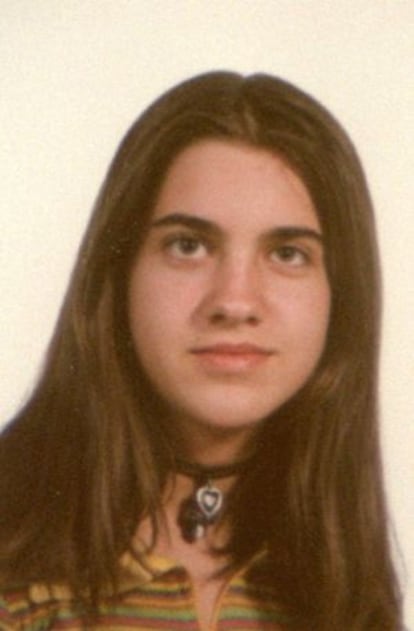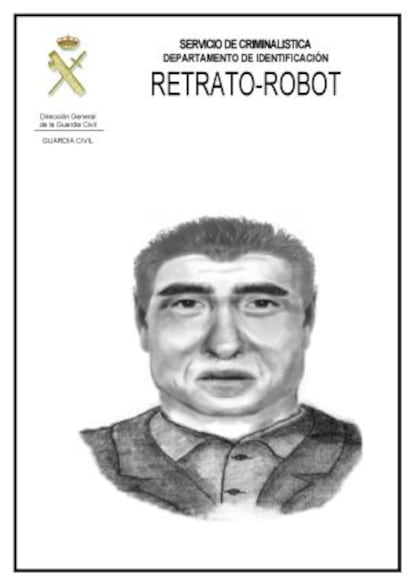Madrid teen’s suspected murderer arrested in France 18 years after crime
Man who investigators believe murdered 17-year-old Eva Blanco was living in French village

On April 20, 1997, a 17-year-old high-school student named Eva Blanco Puig was raped and stabbed to death as she walked home from a nightclub in Algete (Madrid).
Now, 18 years later, French police have arrested the alleged perpetrator of the crime in Pierrefontaine-les-Varans, a village in the northeastern Franche-Comté region.
DNA testing led investigators to A. C. G., a Moroccan-born man with Spanish citizenship.
Over the years, the Civil Guard in Madrid had opened up as many as 100 different lines of investigation into the murder of the young woman, whose body was found in a vacant lot with four stab wounds to her back.
Relatives, friends and acquaintances provided DNA samples, and the police handed out likely facial composites of the murderer. Citizen cooperation was requested, and all males in the area with a criminal record were targeted as part of the investigation. People protested on the streets to demand justice for the parents of Eva Blanco Puig.
But the investigation led nowhere.
It looks like God has heard me and given me some joy after so many years of suffering”
Olga Puig, Eva's mother
But then at 5.30pm on Thursday, Olga Puig and her husband Manuel Blanco received a phone call from the Civil Guard’s homicide department, whose members they have become on familiar terms with over the years.
Captain Rubén Valero informed them that the alleged murderer had been detained three-and-a-half hours earlier.
“It looks like God has heard me and given me some joy after so many years of suffering,” said Puig, standing in front of the house owned by her other daughter Rebeca, who lives across from them. Eva was the eldest of her three girls.

“It was a very emotional moment; the captain also got emotional when he told us about the arrest. He started to cry,” recalled Puig with tears in her eyes. “Now I hope that justice will be done and that this man pays for everything he did to my daughter.”
The teenager’s body was found in an area called Las Pesqueras, near a roundabout on the M-100 road in Algete, 30 kilometers northeast of the capital. Eva had been to a local nightclub with several girlfriends, and around midnight the group decided to go home.
A friend walked Eva to a spot 500 meters from her home on Carmen Conde street, on the outskirts of town. In 1997, there was still little urban infrastructure in the area and few people were out on the streets.
This friend was the last person to see Eva alive.

The autopsy revealed that she had been raped before her death, and semen found inside her body allowed forensics to create a genetic profile of the criminal, who was described as “a male from the Maghreb region.” But this conclusion only came 15 years after the crime.
Investigators crossed that information with nearly 2,000 DNA samples they had taken shortly after the crime from males in the area – including Eva’s schoolmates, teachers, friends’ fathers, construction workers and her own father’s employees at his crane company.
They also tracked down all men of Moroccan origin who had lived in Algete in 1997. This double probe was instrumental in locating the perpetrator, who used to work in construction and may have been personally known to Eva’s father.
A. C. G., now 52, left Spain in 1999 and is now resident in France, where he was living with his wife and children. The French Gendarmerie, acting on a European Arrest Warrant, located him in Pierrefontaine-les-Varans and arrested him at 2.30pm on Thursday.
English version by Susana Urra.
Tu suscripción se está usando en otro dispositivo
¿Quieres añadir otro usuario a tu suscripción?
Si continúas leyendo en este dispositivo, no se podrá leer en el otro.
FlechaTu suscripción se está usando en otro dispositivo y solo puedes acceder a EL PAÍS desde un dispositivo a la vez.
Si quieres compartir tu cuenta, cambia tu suscripción a la modalidad Premium, así podrás añadir otro usuario. Cada uno accederá con su propia cuenta de email, lo que os permitirá personalizar vuestra experiencia en EL PAÍS.
¿Tienes una suscripción de empresa? Accede aquí para contratar más cuentas.
En el caso de no saber quién está usando tu cuenta, te recomendamos cambiar tu contraseña aquí.
Si decides continuar compartiendo tu cuenta, este mensaje se mostrará en tu dispositivo y en el de la otra persona que está usando tu cuenta de forma indefinida, afectando a tu experiencia de lectura. Puedes consultar aquí los términos y condiciones de la suscripción digital.








































